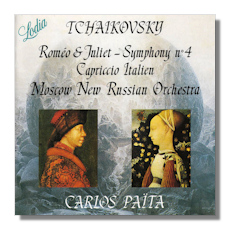
The Internet's Premier Classical Music Source
Related Links
- Tchaikovsky Reviews
- Latest Reviews
- More Reviews
-
By Composer
-
Collections
DVD & Blu-ray
Books
Concert Reviews
Articles/Interviews
Software
Audio
Search Amazon
Recommended Links
Site News
 CD Review
CD Review
Piotr Ilyitch Tchaikovsky

- Romeo and Juliet
- Symphony #4
- Capriccio Italien
Moscow New Russian Orchestra/Carlos Païta
Lodia LO-CD791
Carlos Païta's elusive legacy is hardly helped by the fact that he often worked with odd pick-up orchestras such as these, and never really established a firm connection with any ensemble of major repute. God only knows how this orchestra came about; Lodia obviously wanted him to work in Russia, even if his Tchaikovsky 6th was set down in England. As I've pointed out numerous times though, these albums have been very rare indeed, and serious collectors will be very happy to snap them up from Albany Music Distributors. As an added bonus, this disc is one of the better-filled and intelligently programmed of the Lodia line.
For starters, I like the unique characteristics – such as they are – of this group more than those of the "Philharmonic Symphony Orchestra" that Païta normally worked with. Sure, by 1994, Russian orchestras probably didn't sound especially Russian anymore, but these forces do sport a very aggressive and rough and ready playing style that works well for this music. Incidentally, this is one of the few Lodia releases that has an actual recording date, and that was recorded outside of England. Whether the location or late (for this conductor) recording date matter is up for debate, but everything sounds pretty fabulous.
Romeo and Juliet is tremendously exciting in the middle sections and flanked by some lovely playing on either side. Carlos Païta wasn't subtle; neither was Tchaikovsky, and what didn't work for him in Beethoven turns into a strength in Romantic music. The Symphony #4 is brash and daring in the outer movements and suitably flowing and spiky in the two middle ones. The winds, which always played well for Païta wherever he went, sound wonderful here. The scherzo is predictably swift, but not uncontrollable – the conductor's Beethoven Seventh suffered in this way – and the finale is impressive, if a touch bombastic. Better a little vulgarity than dullness. It doesn't ellipse the great readings of the work, but it does stand as an important document of a little known career.
The disc concludes with a marvelous account of the Capriccio Italien. It's very well played and full of character. The finale is fast and furious, but not so fast that this group can't keep up. I confess that this is not always a work that holds my attention, but there is a real energy here that made the listening experience very enjoyable. To get both short pieces with the symphony is a real treat, and makes a disc that is hard to resist.
Copyright © 2014, Brian Wigman



















